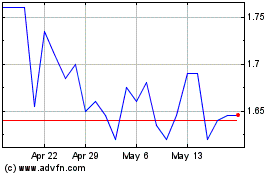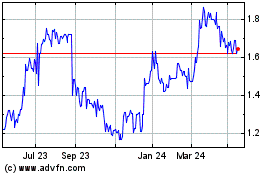New Study Reveals Movio Clients Achieve Revenue Increase in Excess of $220 Million US
April 03 2019 - 12:45PM
Business Wire
Methodology Validated by Harvard Statistics
Expert
Movio, the global leader in data analytics and marketing
solutions for the film industry, has released new research
showcasing the effects of targeted marketing to moviegoers using
their tools. Results show significant increases in cinema
admissions and revenue due to the use of Movio Cinema
worldwide.
Harvard Professor, Donald B. Rubin has confirmed cinema
exhibitors using Movio Cinema collectively experienced a USD227
million incremental box office revenue uplift in 2018. The analysis
showed that moviegoers receiving direct communication via Movio
Cinema increased visitation by 0.89 visits per Moviegoer. As
moviegoers attend with family and friends, this resulted in 1.96
extra admissions, leading to an increase of USD16.61 in box office
revenue, per moviegoer.
The average cinema exhibitor using Movio Cinema has 730,000
moviegoers in their database, equating to a total annual box office
revenue uplift of USD12.1 million dollars for each exhibitor. The
study determined that global box office uplift in 2018 across all
exhibitors, utilizing the Movio Cinema platform, was USD227 million
plus an additional USD97 million in concessions.
Using the theory of Causal Inference, an Observational Study was
designed to model moviegoers’ behavioral and spend patterns. The
methodology incorporated up-to-date thought leadership and
state-of-the-art machine learning techniques to quantify the
effects of targeted marketing using Movio Cinema. The methodology
used has been verified by Professor Donald Rubin, Emeritus
Professor of Statistics, Harvard University, internationally
recognized as a leader in the fields of Statistics and Causal
Inference.
“At Movio, we wanted to definitively measure the visitation and
revenue uplift that exhibitors experience when incorporating Movio
Cinema into their marketing strategy,” says William Palmer, Movio’s
Chief Executive and Co-Founder. “This required an independent
assessment of the findings and there was no one more qualified than
Professor Rubin, one of the leading statistical experts in the
field.”
“Professor Rubin’s validation of our results suggests Movio’s
software presents an exciting opportunity for the cinema industry,”
Palmer continues. “The application of data analytics in marketing
decisions, whether by a studio or by an exhibitor, is now a proven
way to grow box office revenue. Our goal is to continue to develop
innovative solutions that deliver increased box office
success.”
Professor Donald B. Rubin says “State-of-the art statistical
Casual Inference methods, were updated to take advantage of modern
computational advances, such as those used in current machine
learning approaches, and then applied to Movio’s global moviegoer
database, which contains billions of email communication events.
This application numerically quantified Movio’s estimated impact on
the cinema industry.”
Rubin continues, “The objective nature of the evaluation plan
means the results could have actually turned out negative for
Movio, but instead these results strongly support the value that
Movio’s approach can provide to both its clients and the industry
as a whole.”
About Professor Donald B. Rubin
Professor Rubin is the inventor of the “Rubin Causal Model,” the
co-inventor of “Propensity score” methods for estimating causal
effects from non-randomized data, the co-inventor of the “EM”
family of machine learning algorithms, the inventor of “Multiple
Imputation” for missing data, and many other similar techniques.
His work has garnered more than a quarter million citations,
according to Google Scholar, and Googling him and his inventions
creates more than 25 million hits.
About Movio
Movio is the global leader in marketing data analytics and
campaign management solutions, revolutionizing the way the film
industry interacts with moviegoers. Movio supports the world’s most
comprehensive source of moviegoer data and the company’s investment
in data science and machine learning has produced market-leading
technologies that redefine the possibilities of movie marketing.
Movio empowers marketers to connect moviegoers with their ideal
movie via online and offline channels, and link campaign data with
actual ticket purchases to close the loop and measure campaign
effectiveness. Movio is a company of Vista Group International Ltd
(NZX & ASX: VGL).
movio.coTwitter: @MovioHQLinkedIn:
www.linkedin.com/company/movio
About Vista Group International:
Vista Group International (Vista Group) is a public company,
listed on both the New Zealand and Australian stock exchanges (NZX
& ASX: VGL). The Group provides software and additional
technology solutions across the global film industry. Cinema
management software is provided by Vista Cinema, the core business
of the Group. Movio (authority in moviegoer data analytics), Veezi
(cloud-based SaaS software for the Independent Cinema Market),
movieXchange (connecting the movie industry to simplify the
promotion and sale of movie tickets), Maccs (film distribution
software), Numero (box office reporting software for film
distributors and cinemas), Cinema Intelligence (business
intelligence solutions), Powster (creative studio and marketing
platform for movie studios) and Flicks (moviegoer ‘go to’ portal
for movie information) provide an innovative range of complementary
products across additional film industry sectors, from production
and distribution, to cinema exhibition through to the moviegoer
experience. Vista Group has offices located in New Zealand
(Auckland HQ), Sydney, Los Angeles, London, Shanghai, Beijing,
Mexico City, South Africa, the Netherlands and Romania.
www.vistagroup.coLinkedIn:
www.linkedin.com/company/vista-group-limited
View source
version on businesswire.com: https://www.businesswire.com/news/home/20190403005659/en/
Media Contacts:Maggie Begley/MBCMaggie@mbcprinc.com; +1
310 390 0101
Holly Jonesholly@movio.co
Vista (ASX:VGL)
Historical Stock Chart
From Dec 2024 to Jan 2025

Vista (ASX:VGL)
Historical Stock Chart
From Jan 2024 to Jan 2025
